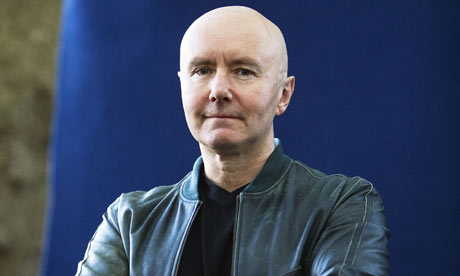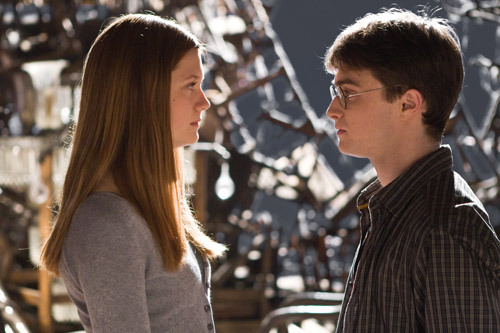
Okay, okay, so I've found yet another weekly meme thing. You have to admit, however, that I've at least been consistent in posting every day because of them. :)
The Literary Blog Hop is hosted by
The Blue Bookcase and it's for book bloggers whose tastes run a bit more toward the literature side of the book spectrum. Each week a prompt is given and participants give their answer to that prompt.
This week's prompt is: Discuss your thoughts on sentimentality in literature. When is emotion in literature effective and when is it superfluous? Use examples.
My answer:
There are so many ways to use sentimentality and romance in literature. Some are better than others. Personally I find that emotions are much more effective when they develop gradually instead of appearing instantaneously as if by magic. I get really annoyed by the constant barrage of "love-at-first-sight" and "I love you because we were thrown together in a difficult situation" storylines that permeate novels. I also hate the "I'm angry or sad but my author is bad at writing these emotions" scenarios. As you'll see, it isn't just romance novels or "chick lit" that do this. These kinds of ridiculous notions abound in all forms of literature. There are, however, a few novels that get it right.
The Losers
Harry Potter
I love the
Harry Potter series. They're fun, exciting, well-written. There's just one thing that J. K. Rowling seems to not be able to do--write a convincing love story. I enjoyed watching Ron and Hermione squabble themselves into a relationship. I think that their romance developed at a nice pace, with plenty of bumps along the way. Two other love stories in these books did not.
What the heck was with Lupin and Tonks? Lupin is one of my favorite characters in these novels and I quite liked Tonks when I first met her. Put the two of them together, however, and it just spells disaster. I couldn't find them believable as a couple. She was lovesick and he seemed to only be obliging her. He didn't even want to stick around after he married her. It was, frankly, a bad move on Rowling's part.
No. Just...no. I don't particularly like Ginny, to be honest, but this whole relationship just seemed fake and forced. It was like Rowling was just trying to give Harry someone else to care about that he could possibly lose. I never got the feeling that they really cared about each other and it all happened so suddenly that I couldn't take it seriously. Development of a relationship is just as important as snogging, even in a children's book.
Wuthering Heights
If I ever found two characters I hate more in literature than Heathcliff and Catherine, I'd probably send the author of that book a fruit basket. She's whiny and vindictive, he's an abusive emo kid all grown up. It wasn't so much their love story that I minded; instead, it was Heathcliff's reaction to her death. Angry and grief have their place in literature, but these are both emotions that many authors can't seem to convey without being melodramatic. Heathcliff goes beyond melodramatic--he becomes downright psychotic. The next time anyone tells me that Heathcliff is an amazing, brooding character, I'm probably going to smack them.
Romeo and Juliet
Yes, I know that this is Shakespeare and therefore it's unconscionable for me to complain about this play.
Romeo and Juliet, however, is to blame for much of the crap-tastic romance that we find in novels throughout history. Here is the classic boy-meets-girl-and-falls-madly-in-love-with-her-even-though-he's-just-met-her story. I
hate stories like that. Don't get me wrong. I'm a romantic guy. I just don't believe that you can love someone at first sight. Love takes time, it needs to develop. You can like someone at first sight, you can lust for someone at first sight, but love is a gradual process. It takes trust and knowledge of the other person and a whole slue of other things that can't be gained during the first 2.5 seconds of meeting someone. This is why the story of Juliet and her Romeo really bothers me. Not only do they throw everything away for each other, they die for each other...and they don't even know each other's favorite color for crying out loud. This play has spawned countless other tales of star-crossed lovers as well as an infinite number of stories in which people just sort of fall in love and are each other's everything even though they know nothing about each other.
The Winners
Pride and Prejudice
There are some who will disagree with me on this, but I think
Pride and Prejudice is not only one of the most romantic novels of all time, it's also one of the best romantic novels of all time. Jane Austen really knows how to build relationships and express emotion. When her characters are angry, they're believable. When they're sad, they're believable. When they're in love, they're very believable. The relationship between Mr. Darcy and Elizabeth Bennet doesn't happen overnight. They don't just fall into each other's arms two seconds after being introduced and declare their undying love for one another. Instead, it takes an entire novel for them to finally get over their own personal flaws and discover that they are truly meant for one another. That, my friends, is a good use of sentimentality.
The Importance of Being Earnest
I'm including this on the list of winners because Oscar Wilde is so good at satirizing sentimentality. There are no sacred cows in this play--love, hate, propriety, friendship; everything is skewered by Wilde's sharp-tongued words. Here we have four ridiculous characters who are all self-absorbed and shallow. The women think they love the same man, Earnest (who doesn't even exist), just because his name is Earnest. The men want to marry the women because, well, they're hot. The play is funny and it really plays with emotion in a unique way. Emotions are something to be ridiculed. They are not to be admired but, rather, they are to be discouraged (at least, if Lady Bracknell has anything to say about it).
The Importance of Being Earnest is a great play to read if you're getting sick of all of the mindless, superfluous romance out there.
Great Expectations
I read this book for the first time when I was in high school and it really touched me in ways that other books hadn't before. Pip, despite being kind of whiny, is a wonderful character, as are the others that populate the world of
Great Expectations. There's a lot of emotion running through this novel--love, anger, fear, hatred, sorrow, betrayal, revenge. Dickens weaves them throughout the story with a deftness unsurpassed by other writers. One of the greatest things about this book, however, is that Pip never really gets what he wants. His love of Estella is unrequited and his pining for her is so poignant that I couldn't help but feel for him.
There is a time and a place for sentimentality. It all comes down to whether or not the author is skilled at expressing emotion and whether or not they're just trying to rush the love story to get to whatever the payoff is at the end. One last example of this is
Cold Mountain by Charles Frazier--the novel versus the film. The novel is about the journey, not the destination. Inman's travels through the South on his way home from the Civil War are far more important to the story than his actually getting home. It's one of the reasons why Frazier used allusions to
The Odyssey. The film, however, makes the journey less important, which I think is a travesty. Rather than showing how Inman changes on the road to Cold Mountain, the film picks and chooses his encounters and throws them around haphazardly because, in the end, it's all about the sex scene between Nicole Kidman and Jude Law that comes at the end of the film. The destination is now more important than the journey. Frazier's novel uses emotion and romance in a subtle way; Minghella's film throws it all in your face and expects you to be happy with it. I, for one, was not.
-Gabe










